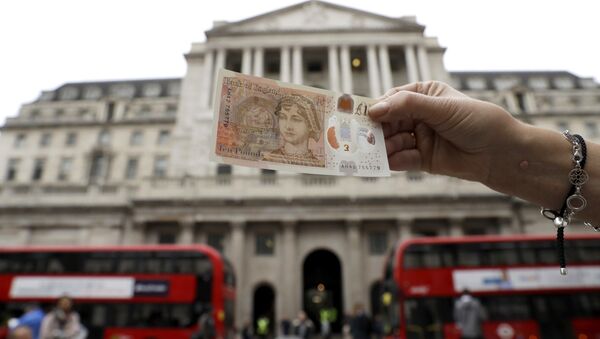Kristian Rouz — The UK is facing the risk of an economic slowdown in the coming months due to the lack of clarity and elevated political tensions over Brexit, top analysts have warned. Experts say a no-deal Brexit could impact property prices and levels of investment, hindering overall business activity in Britain.
However, any projected outcome of the Brexit process is unlikely to provoke an economic recession, while the UK's GDP growth rate is expected to outpace that of Germany — the EU's economic powerhouse — this year.
The NIESR shrugged off recent economic forecasts from both the Bank of England (BoE) and the UK Government's Office for Budget Responsibility (OBR), which predicted a lower GDP growth rate for this year.
NIESR experts said the BOE and OBR's methodology is inadequate, with economists insisting that government and central bank officials have based their forecasts on a range of possible Brexit outcomes, which are nearly impossible to predict due to the ever-changing political and diplomatic implications of the divorce process.
"I've argued since before the referendum that it makes no sense to aggregate across different Brexit outcomes," NIESR Director Jagjit Chadha said.
READ MORE: France Activates Plan for No-Deal Brexit After May's Historic Defeat in Parl't
The NIESR also said the UK economy could slow down to 0.4 per cent annual growth rate for 2019 if Britain crashes out of the EU without a deal. This would be due to a slump in capital formation, foreign direct investment (FDI), and asset values across various sectors of the economy.
Still, experts believe that any of the two outcomes would still leave Britain with a higher GDP growth rate than Germany.
The Office for National Statistics (ONS) said the UK's quarter-on-quarter GDP growth rate was 0.3 per cent in the fourth quarter of 2018 (Q4), down from 0.4 per cent in the previous reporting period.
Meanwhile, researchers said the UK's industrial production dropped by 1.5 per cent — the biggest decline since August 2013.
However, production in Germany declined by 1.9 per cent this past November alone, while year-to-date German factory output fell 4.7 per cent as of that month.
Experts say the Brexit uncertainty is hurting economies on both sides of the English Channel — but Britain's ultra-low unemployment rate is softening its impact on households.
"There may well be a common theme which is hurting the factory sector throughout Europe, for example changes in the auto industry," Philip Shaw of Investec said
READ MORE: Farage Slams PM May's 'Surrender Document' Brexit Deal, Demands Her Resignation
Meanwhile, a separate report from Capital Economics predicts the UK's economic growth to be 1.8 per cent for 2019 if PM May ensures a soft and orderly Brexit. If the PM fails to reach a Brexit consensus in parliament, Britain's GDP growth rate would slow down to 1.5 per cent for this year, according to Capital Economics.
Finally, if Britain leaves without a deal, it could face a recession, with GDP shrinking by 0.2 percent in 2019 alone.
"Given the huge and growing uncertainty surrounding Brexit, we are now placing much more emphasis on three forecasts for the economy that are based on different Brexit outcomes", Capital Economics' Paul Dales said.
In this light, some point out that many experts had predicted a recession to take place immediately after the 'Leave' vote back in June 2016. However, these fears failed to materialise, as a subsequent devaluation of pound sterling helped Britain boost its exports — which are still expanding today.
Most forecasters also conceded that the possible impacts of a no-deal Brexit are still hard to quantify, as it remains unclear how many investors would actually pull their capital from the UK, and how many property and business owners would liquidate their British assets.
And, most importantly, it's yet to be seen how Britain's international trading partners will react to Brexit, either distancing themselves from the UK or using the withdrawal as an opportunity to explore new avenues for bilateral trade.







